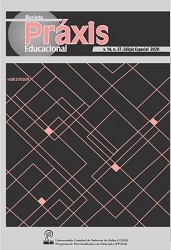TEACHING STRATEGIES METHODS AND TECHNIQUES USED BY PRESCHOOL TEACHER CANDIDATES
DOI:
https://doi.org/10.22481/praxisedu.v16i37.6171Keywords:
Special Teaching Method Course, Teaching Methods, Teaching Strategies, Teaching TechniquesAbstract
This research was conducted in order to determine the which strategies, methods and techniques used by the preschool teacher candidates who prefer to use in the classroom activities in Special Teaching Methods I and II course. The researchers aimed what kind of educational strategies, methods and techniques that the prospective preschool teacher candidates preferred to use in the course of their activities in the Special Teaching Methods. Qualitative research methodologies used for this research. Descriptive and content analyses were conducted in the qualitative dimension of this study. Descriptive analysis has been used in this qualitative dimension by taking direct quotations from the statements of participants in the analysis of descriptive data. This study has been carried out in Nicosia, Cyprus, in 2016 – 2017 academic year. Sample group 87 preschool teacher candidates voluntarily participated to this study. According to results of the study, it has been indicated that the preschool teacher candidates are using mostly classical teaching strategy, methods and techniques. However, preschool teacher candidates prefer to use contemporary teaching strategies, methods and techniques like drama.
Downloads
Metrics
References
Açıkgöz, K. (1998). Etkili öğrenme ve öğretme. İzmir: Kanyılmaz Matbaası.
Baykara, K. (2013). İçeriğin ve eğitim durumlarının düzenlenmesi. H. Şeker (Ed.), Eğitimde program geliştirme kavramlar yaklaşımlar (ss.164-182). Ankara: Anı Yayıncılık.
Bulut, A., & ve Aktepe, V. (2015). Yaratıcı Drama Destekli Matematik Öğretimin.
Öğrencilerin Akademik Başarısına Etkisi. Kastamonu Üniversitesi Kastamonu Eğitim Dergisi, 23(3), 1081-1090.
Covill, A. (2011). College Students Perceptions of the Traditional Lecture Method. College Student Journal, 45(1), 2-15.
Kahyaoğlu, M., & Yangın, S. (2007). İlköğretim Öğretmen Adaylarının Mesleki Öz Yeterliklerine İlişkin Görüşleri. Kastamonu Eğitim Dergisi, 15, 83-105.
Kandemir, A. (2016). İlkokul 2. sınıf İngilizce öğretim programının katılımcı odaklı program değerlendirme yaklaşımıyla değerlendirilmesi (Yayımlanmamış Yüksek Lisans Tezi). Pamukkale Üniversitesi, Denizli.
Keskin, A. (2009). İlköğretim düşünme eğitimi dersi (6., 7., ve 8. sınıf) Öğretim Programının değerlendirilmesi. (Yayımlanmamış Yüksek Lisans Tezi). Mustafa Kemal Üniversitesi, Sosyal Bilimler Enstitüsü, İlköğretim Anabilim Dalı, Hatay.
Marbach, G., Seal, O., & Sokolove, P. (2001). Student Attitudes and Recommendations On Active learning, Journal of College Science Teaching, JO, 434-438.
Özden, Y. (2000). Öğrenme ve Öğretmen, Pegem A Yayıncılık, Ankara.
Öztürk, B. (1996). Genel öğrenme stratejilerinin öğrenciler tarafından kullanma durumları. Marmara Üniversitesi Atatürk Eğitim Fakültesi İkinci Ulusal Eğitim Sempozumu Bildirileri. İstanbul, 239-244.
Saban, A. (2004) Öğrenme Öğretmen Süreci Yeni Teori ve Yaklaşımlar, Nobel Yayınevi, Ankara.
San, 1. (1990). Eğitimde Yaratıcı Drama. Ankara Üniversitesi Eğitim Bilimleri Fakültesi Dergisi, 23(2), 573-582.
Ulubey, Ö., & ve Toraman, Ç. (2015). Yaratıcı Drama Yöntemının Akademık Başarıya Etkısı: Bır Meta-Analız Çalışması. Mustafa Kemal Üniversitesi Sosyal Bilimler Enstitüsü Dergisi. Cilt:12, Sayı: 32.
Uşaklı, H. (2014). Drama ve İletişim Becerileri Teori, Araştırma, Uygulama. (3.Baskı) Nobel Yayıncılık.
Downloads
Published
How to Cite
Issue
Section
License
You are free to:
Share - copy and redistribute the material in any medium or format; Adapt - remix, transform, and build from the material for any purpose, even commercially. This license is acceptable for Free Cultural Works. The licensor cannot revoke these freedoms as long as you follow the terms of the license.
Under the following terms:
Attribution - You must appropriately give credit, provide a link to the license, and indicate if any changes have been made. You may do so in any reasonable way, but not in a way that suggests that you or your use is endorsed by the licensor.
There are no additional restrictions - You cannot apply legal terms or technological measures that legally restrict others to make any use permitted by the license.










